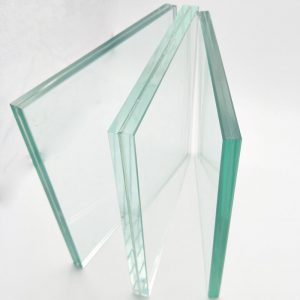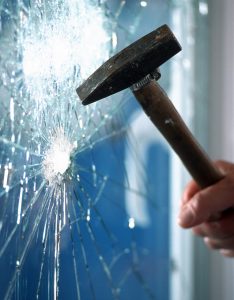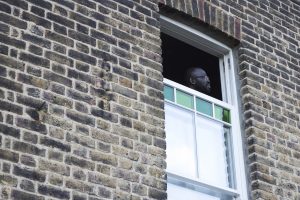If you’ve done any research on window soundproofing, you’ll find laminated glass is almost always mentioned.
What makes this type of glass so special?
How does laminated glass soundproofing compare with alternatives like acoustic-grade, or simply using thicker glazing?
Do you have to use laminated glass panes if you want to truly reduce noise?
Ask the experts – or your neighbours down the street who just had their windows retrofitted – this type of glass definitely has a few perks that have established its reputation as one of the best options for serious noise reduction.
1. Laminated Glass Was Born to Muffle Sound
Well, not technically. Laminated glass was invented by chance by the French chemist, Edouard Benedictus. When he dropped a glass flask coated in plastic, he found that his plastic cellulose nitrate outer layer caused the glass to shatter instead of breaking.

Because of its ‘unbreakable’ properties (no glass is truly unbreakable but laminated comes remarkably close), laminated glass is well known as a safety and security glass. However, because of the way it is manufactured, it also acts as an effective barrier for sound.
To dampen nerve-crunching decibel levels and drown out the high pitch of screeching brakes and the anxious barking of your neighbour’s dog, laminated glass will do the job.
Laminated glass consists of two glass panes with an interlayer sandwiched in between. This construction creates a more complex obstacle for sound to travel through. The interlayer also creates a distinctive noise reduction benefit. It is usually made from polyvinyl butyral, or PVB, which has unique vibration dampening properties.
This helps to make laminated glass particularly effective at empowering property owners to finally get the peace and quiet they are looking for.
2. It Is Surprising How Much Laminated Glass Reduces Noise
How well does laminated glass reduce noise? How effective your laminated glass will depend on the thickness of the glass and the interlayer – more mass equals more thorough soundproofing. Your overall results will also hinge upon the other features of the insulated glass unit (IGU) that the laminated glass is used within.
An IGU consists of two panes of glass with an air space in between. Each piece of glass will have its own thickness and can be a certain type of glass such as laminated, acoustic-grade or standard glass. The air space also impacts noise reduction somewhat – more space, less noise.
There is no one answer to how much noise reduction occurs when you choose laminated, as there are other factors that will determine the overall effects. However, to give you an idea of the impact of laminated glass for dampening unwanted sounds and vibrations, one 6.5 mm sheet of laminated can yield 32 decibels of noise reduction at an average frequency level of 400 Hz.
A complete IGU with 2 panes of standard glass, each with a 4 mm thickness plus 12 mm of air space (for a total thickness of 20 mm), will achieve about 27 dB of reduction.

3. Laminated Glass Is More Efficient Than Acoustic Grade Glass
Acoustic glass is a little different than laminated glass.
Instead of the PVB interlayer, acoustic glass contains a special resin as an interlayer in between two sheets of glass. Like laminated glass, it looks just like a normal pane of glass – you won’t notice the ‘sandwich’ construction just by looking at it. And, you can get varying grades of acoustic glass by increasing the thickness of the resin interlayer and glass.
Whilst acoustic glass is certainly an effective choice for serious soundproofing, the results are not that much different than what you’ll notice with laminated glass.
In fact, you may not be able to detect an audible difference at all. The human ear can’t pick up a change of 3 decibels or less. Because the difference is minimal, many property owners gravitate towards using laminated glass in their double glazing units rather than spending more on acoustic grade.
Acoustic grade glass tends to be more expensive than standard laminated glass. Also, laminated is more well known for its superior safety and security features because it is so hard to shatter, let alone break, providing another highly valued window feature.

4. Two Panes of Laminated Glass Aren’t Necessarily Better Than One
If one pane of laminated glass is so powerful, wouldn’t two double the impact?
You actually don’t need two thick pieces of laminated glass to get the best results. Varying the thicknesses will help to increase the sound dampening impact of your double glazed windows. In most cases, using one pane of laminated glass and one of a standard glass of different thickness is enough to block out most noise pollution issues.
5. Using Laminated Glass for Secondary Glazing May Give You Some Unwanted Negatives
Some property owners believe they can save money by using laminated glass with secondary glazing. After all, one pane of laminated glass will have a big impact on your noise troubles. Attaching it to the inside of your current window seems like a simple, affordable solution.
The truth is, you can spend about the same amount on secondary glazing and on double glazed windows if you get your windows retrofitted, rather than having a new double glazing system installed. Both secondary glazing and retrofit double glazing cost a fraction of the price of new double glazing.
Also, secondary glazing has a few drawbacks you need to be aware of before you make the investment:
- A secondary glaze doesn’t allow you to retain the original functioning of sash windows – Thermawood will re-balance the sash weights on your heritage windows so you can enjoy the peace and quiet that comes with laminated double glazed windows, without ruining the way your windows open and close.
- Secondary glazing can impact the aesthetics, which can drive down the value of your property, and you’ll lose the charm of your current windows – retrofitting won’t alter your aesthetics.

6. Your Soundproofing Is Only as Effective as Your Building Envelope
Laminated glass can do its job, enforcing your windows with noise and thermal insulating benefits, whilst also increasing the security of your property. But if you have open spaces around your windows where a draft enters, you have an opening for sound as well. Also, if your doors and walls aren’t thick enough or made from the right materials, sound can also travel through these areas.
In Thermawood’s patented dry retrofit double glazing process, acoustic seals are installed in the window when your existing timber windows are converted. These seals help to block out noise and drafts, offering more complete insulation. You can also consider upgrading your doors to either glass or a high-quality wood, both of which have excellent sound dampening properties. Applying acoustic sealant to any potential problem areas around your home can also help.
Should You Use Laminated Glass?
Laminated glass has become a popular choice for property owners looking for ways to soundproof their home or other space. It has plenty of advantages, from serious noise reduction to better security. It does cost more than standard glass, depending on which thickness you use.
Whether you need it or not, and on which windows, depends on the nature of your noise pollution. Professional soundproofing experts will check out your property’s needs and give you an honest assessment of what you require to get the results you want, at the best value.

[Free Guide]
Learn All About Reducing
the Noise Entering Your Home
or Building

